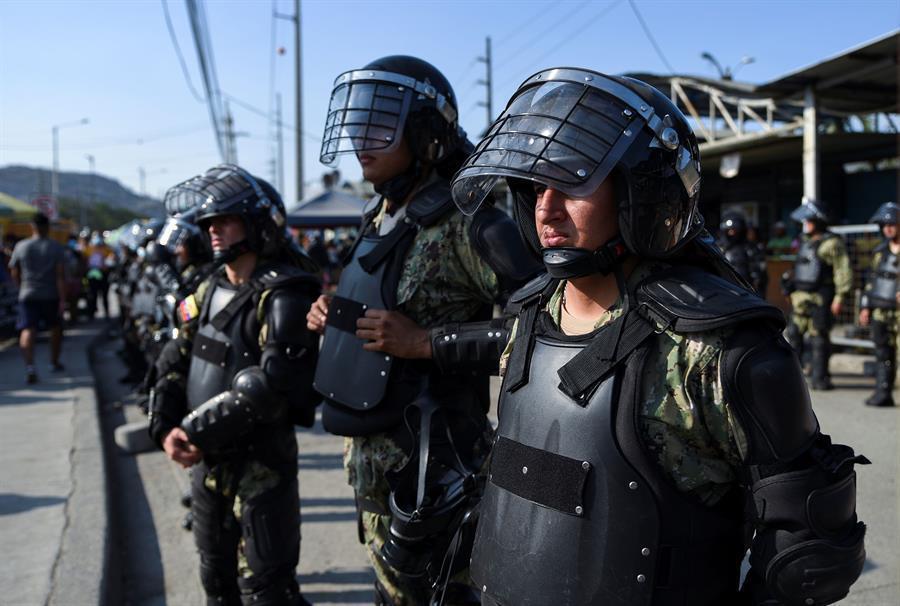
Police gained control of an Ecuador prison on Sept. 30 where rioting has left at least 118 inmates dead, some of them decapitated, as rival drug gangs went to war armed with guns and grenades.
Another 86 inmates were wounded, six of them critically, according to Ecuador’s prisons authority, in one of the deadliest prison battles in South American history.
The riot broke out Tuesday at a prison complex in the port city of Guayaquil between prisoners believed to have links to Mexican drug gangs - mainly the Sinaloa and Jalisco New Generation cartels.
By late Thursday police commander General Tannya Varela told reporters that the inmates "no longer have control of the cell blocks," adding that the prisoners were now back in their cells and "everything is calm."
The restored order came after a massive security operation involving some 900 officers and members of tactical units engaged in what the police service said was a "mega-operation" to regain control.
On Wednesday at least two officers were injured when rioting inmates, armed with guns, attacked police sent in to retake control of the facility.
Soldiers and tanks were also stationed outside the jail, where hundreds of worried family members have gathered, desperate for news from the men locked up inside.
"It is a very painful thing.... They say people have had their heads taken off," said Juana Pinto, who was seeking news about her inmate son.
Ermes Duarte, 71, who came from the nearby rural town of Salitre, said his son "was only 15 days away from being released. I came because I saw a video, sent to me by cell phone, where I recognized his head."
According to local news site Primicias, the violence erupted when prisoners from one gang celebrated the birthday of one of their leaders and bragged about their control of the prison, sparking the fury of rival groups elsewhere in the facility.
Tuesday’s violence was the latest in a series of bloody prison clashes that have claimed the lives of more than 230 inmates in Ecuador so far this year.
At least six victims were beheaded, according to the national prosecutor’s office.
In response to the riot, the government decreed a state of emergency allowing it to suspend prisoners’ civil rights and to use public force - including the military - to restore order. President Guillermo Lasso visited Guayaquil on Wednesday.
Ecuador’s prison system has 65 facilities designed for about 30,000 inmates but actually houses 39,000, watched over by 1,500 guards -- a shortfall of about 3,000, according to experts.
Corruption is rife and inmates are able to acquire arms and ammunition.
On February 23, simultaneous riots at four jails including Guayaquil left 79 inmates dead, several of them also beheaded.
Last week police confiscated two pistols, a revolver, some 500 rounds of ammunition, a hand grenade, several knives, two sticks of dynamite and homemade explosives at one of the city’s prisons.
Two weeks ago, Guayaquil’s Prison Number 4 was attacked by drones, part of "a war between international cartels," prison authorities said. There were no casualties in that attack.
The country’s human rights ombudsman said there were 103 prison killings in 2020.
Criminal groups "have taken over the country’s prisons and are trying to send a message to the state that they are stronger than the rule of law," said Itania Villarreal, a former director of the agency in charge of prisoner rehabilitation.
"The prison system has collapsed," she said.
Security expert Freddy Rivera of the Latin American Faculty of Social Sciences in Quito said many prisoners had ties not only to Mexican cartels, but to gangs in neighboring Colombia.
Ecuador’s prisons have become "criminal central command centers" from which illicit activities are planned and ordered, he told AFP, adding that the country’s prison massacres in recent years have exceeded those of Brazil and Venezuela.
Located between Colombia and Peru, the world’s leading cocaine producers, Ecuador is a key transit for drug shipments to the United States and Europe.
Guayaquil is Ecuador’s most populous city and its main port.